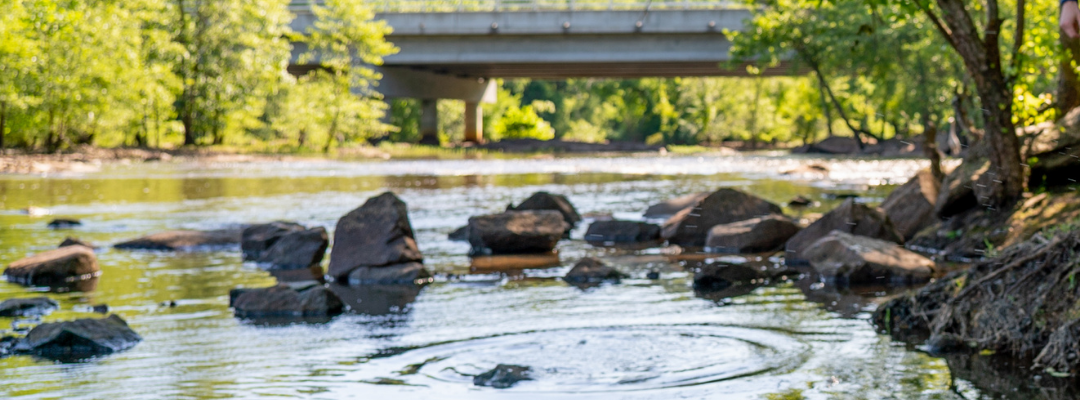Reflection of Service: Resilience Corps NC 2023-24
Highlighting the positive contributions made by members to communities during their service term
Through each AmeriCorps service term, CTNC’s Resilience Corps NC program builds partnerships and fosters collaboration throughout North Carolina to achieve a more resilient state, better prepared to meet the challenges presented by our changing climate.
At the end of July, Resilience Corps NC members gathered in Wilmington, NC for an End of Year Summit. During the event, we sat down with members to learn more about their service term and asked them the following questions:
- What led you to serve with Resilience Corps NC?
- What was a highlight or rewarding experience of your service term?
- What does a resilient community mean to you?
Their answers vary, as members are placed at host sites throughout the state, each working toward specific goals to better their local communities. One thread that ties every service placement together is the great impact that one person can have in strengthening the community and furthering our shared conservation goals. As we reflect on the last service term and look ahead to the outcome of the current term, we are grateful for their perspective.
With the 2024-25 service term underway, progress made during the previous year advances, ensuring that the contributions made by members are built upon and expanded. Last year, there were 24 members stationed at 18 host sites. This year, 24 members are serving local communities through 21 host sites. Six members from the previous service term decided to stay with Resilience Corps NC for a second term. Five of the returning members are featured in the video: Rae Cohn, Jessica Blackburn, Gina Patton, John Sugg, and Lauren Waibel. By choosing to return, they will ensure continuity for the organizations they serve, strengthening long-term program sustainability and deepening their impact.
We look forward to seeing our current members’ contributions to their host site and building connections in their community. Through environmental education, land protection and stewardship, flood mitigation, volunteerism, and climate and conservation outreach, our members are actively contributing to bettering our state for future generations.
Welcoming the 2024-25 Resilience Corps NC Cohort
Expanding statewide partnerships through collaborative resilience-focused service
Resilience Corps NC, CTNC’s AmeriCorps program, has recently welcomed its latest cohort of service members who will be serving with organizations throughout North Carolina. Members will focus on a variety of crucial areas including environmental education, land protection and stewardship, volunteerism, and climate and conservation outreach, all in the service of strengthening community resilience across the state. Their efforts will help boost the capabilities of each host site as they collaborate with local communities.
This year, Resilience Corps NC features 21 host sites and 24 members, including 6 members returning for a second year of service. The program has also grown to include 6 new host site organizations, broadening CTNC’s network of conservation and community partners. Our members are stationed across the state, from the mountains of Sylva to the coast of Wilmington.
Resilience Corps NC 2024-25
| Anyah Brown Town of Princeville | Colby Dukas Piedmont Triad Regional Council | Courtney Smith North Carolina Zoo | Eli Haines-Eitzen* Eno River Association |
| Fiona Thompson Boys and Girls Club of the Plateau | Floyd Pearsall North Carolina Coastal Land Trust | Gina Patton* Balsam Mountain Trust | Gracie Bartel Keep Charlotte Beautiful |
| Hayden Reed North Carolina Zoo | Jack Kagan North Carolina Foundation for Soil & Water Conservation | Jadon Hernandez North Carolina Zoo | Jessica Blackburn* Highlands-Cashiers Land Trust |
| John Sugg* Upper Coastal Plain COG | Josephine Schall Working Landscapes | Joshua Myrick Piedmont Environmental Alliance | Lauren Waibel* North Carolina Coastal Land Trust |
| Nicole Manalis Kerr Tar COG | Preference Evans A Better Chance A Better Community | Rae Cohn* The Hub Farm | Sarah Gelleny Green River Preserve |
| Savannah Lytle Cape Fear River Watch | Sierra Stickney Sound Rivers | Stacy Dominguez Coastal Carolina Riverwatch | Sterling McDonald Central Pines Regional Council |
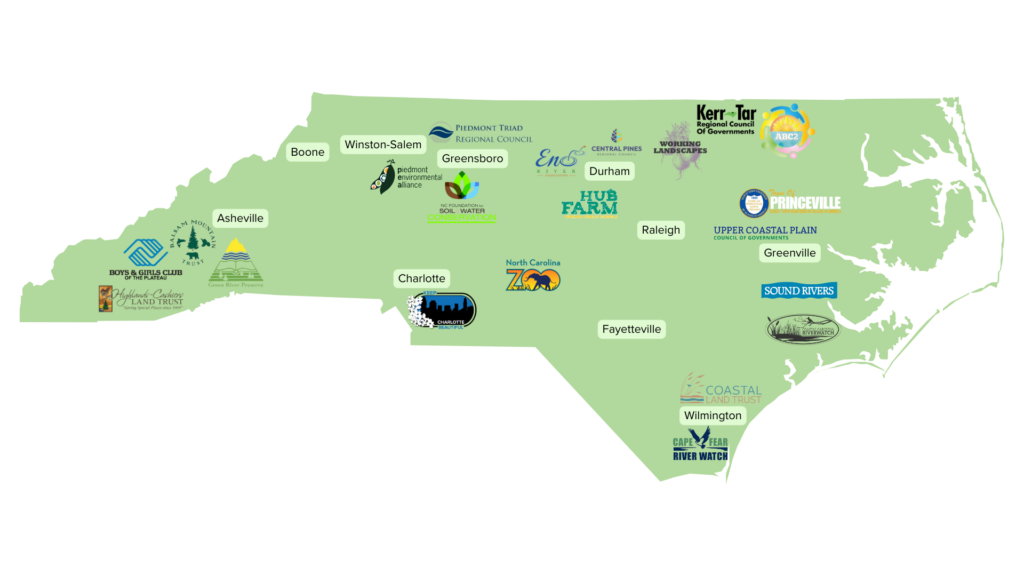
In addition to the satisfaction of knowing they are making a difference, members will receive educational benefits, professional development training, and networking opportunities throughout their term, equipping them for future careers in conservation and community leadership beyond their service term. These opportunities may include Environmental Education certification, attendance at conservation conferences, career development training, and more.
We’re proud to share that several host site organizations represented on the map above now employ Resilience Corps NC alums, who have made a lasting commitment to conservation, nature-based solutions to climate change, and community resilience, in part because of the strong footing they gained by going through the program.
We are thrilled to have 6 members returning for a second year of service with Resilience Corps NC
In the east, John Sugg will build on the successes he achieved with the Upper Coastal Plain Council of Governments across five counties last year, focusing on a variety of flood mitigation strategies. Lauren Waibel will also return to the coast to serve with our partners at North Carolina Coastal Land Trust, carrying out the important work of stewarding land and building capacity for community conservation.
In the Piedmont, Rae Cohn will return to serve as an Environmental Educator with the Durham Public Schools Hub Farm, helping shape the next generation of environmental stewards. Eli Haines-Eitzen will also continue serving as Education Program Coordinator with the Eno River Association, expanding their capacity to educate and inspire present and future conservationists.
And in the west, Gina Patton will support our partners at the Balsam Mountain Trust by conducting environmental education and community outreach. Finally, Jessica Blackburn will return to the mountains to serve with our partners at Highland-Cashiers Land Trust and continue educating the next generation about the flora, fauna, and culture of the Southern Appalachians.
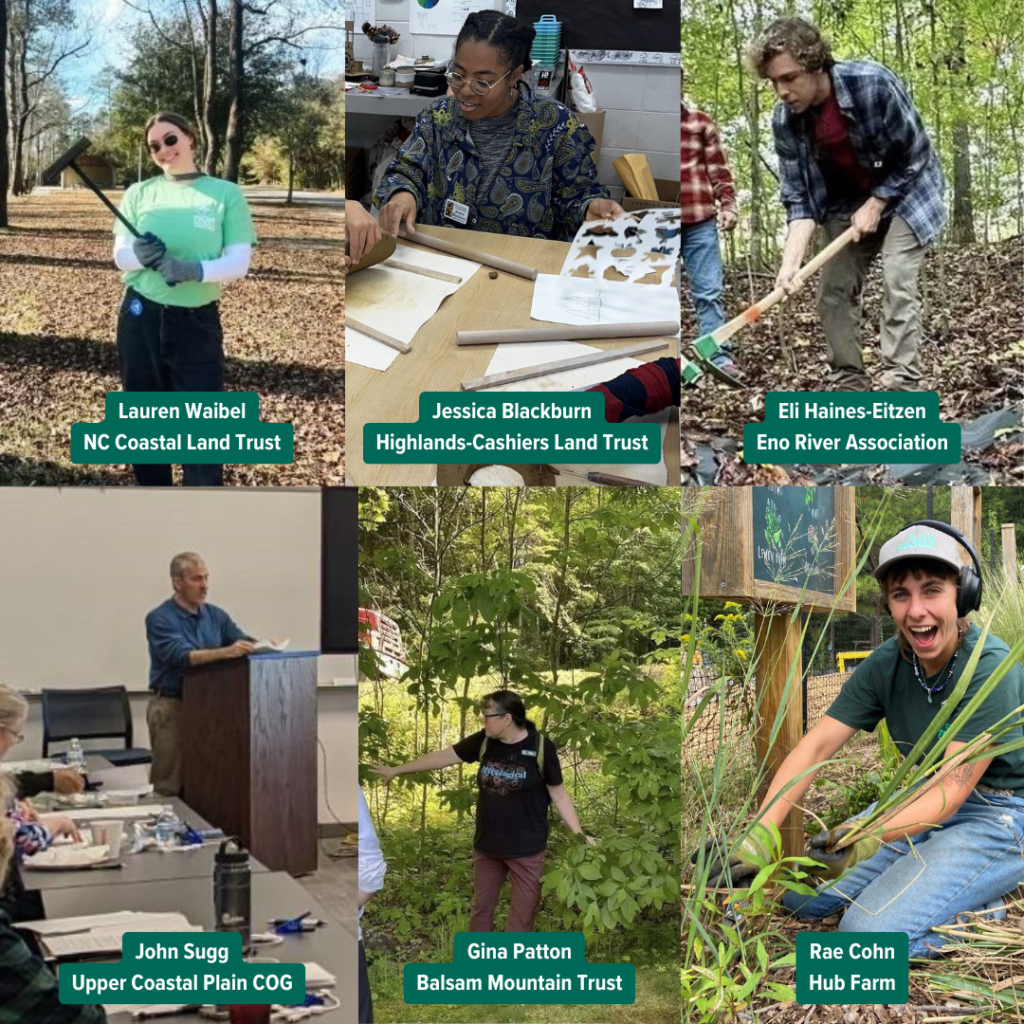
We are fortunate for the renewed commitment made by John, Lauren, Rae, Eli, Gina, and Jessica. Because they chose to return, they will provide continuity for the organizations they serve in, helping them sustain program efforts long-term and increase the depth of impact. Knowing our program now consists of 25% returning members allows us to create a stronger foundation for new members to thrive.
Knowledgeable peers are a vital part of ensuring that new members hit the ground running. This was apparent during cohort orientation when senior members spent hours sharing recommendations with new members, patiently listening to their questions, and planning ways to support each other throughout this term.
Looking ahead at a stronger cohort and stronger communities
This cohort will serve in rural, suburban, and urban areas. Many were born and raised in NC, while others chose to move from other states to serve here. Members representing this cohort span across the spectrums of age and education, our youngest members are in their 20s and our oldest are in their 60s, highlighting that there is no set timeline or pathway to participating in public service.
We look forward to sharing more about each member and their impact as the 2024-25 service term goes on. In the meantime, we are confident that the communities they serve will be better prepared to meet the challenges presented by our changing climate because of their efforts in community engagement, environmental education, and conservation stewardship. Stay tuned to share in their trials and triumphs.
Eastern North Carolina AmeriCorps Members Making Great Strides in Community Resilience
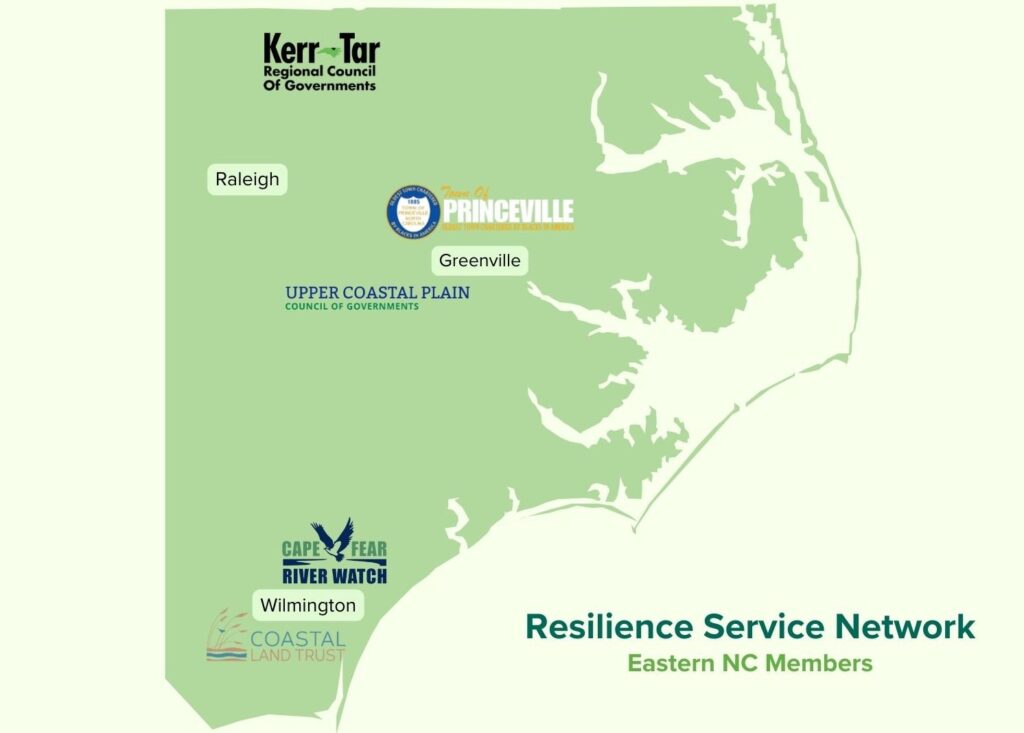
From Flood Resilience, Watershed Protection, Community Agriculture and More, ResilienceCorps NC Members are Contributing to the Resilience of Eastern NC
In Eastern North Carolina, six AmeriCorps service members are serving local communities. Each member is focusing on building community resilience through flood mitigation, coastal land preservation, volunteer coordination, tree planting and watering, community garden construction and implementation, and many other priorities that directly give back to their respective communities.
Through the CTNC’s Resilience Corps NC AmeriCorps program, building capacity is more attainable. The placement of members directly contributes to the current and future projects that nonprofits and local government/agency partners involved in the program hold to benefit North Carolina.
Highlighting AmeriCorps Member’s Service at a Community Level Throughout the Eastern Region of our Resilient State
Tykia Lewis: The Town of Princeville
CTNC and the Town of Princeville have partnered to host an AmeriCorps member to focus on engaging residents on conservation and community agriculture. Over the past few months, Tykia Lewis has been dedicating most of her time to construction and cultivation of the new community garden in Princeville, NC. Her primary focus revolves around fostering community engagement and imparting knowledge about the significance of local agriculture and the medicinal properties of food.
After conducting a thorough needs assessment, Tykia organized community meetings to introduce the benefits of community gardening and to distribute fresh produce. The community demonstrated keen interest in the garden and the healing potential of food, actively participating in choosing a name for the garden. Her involvement in the garden’s design and construction has been immensely gratifying, as she values hands-on experiences and the opportunity to contribute to a cause larger than herself.
This community garden will impact the town and its residents for years to come, serving a key role in removing the barriers to food access that towns like Princeville experience.
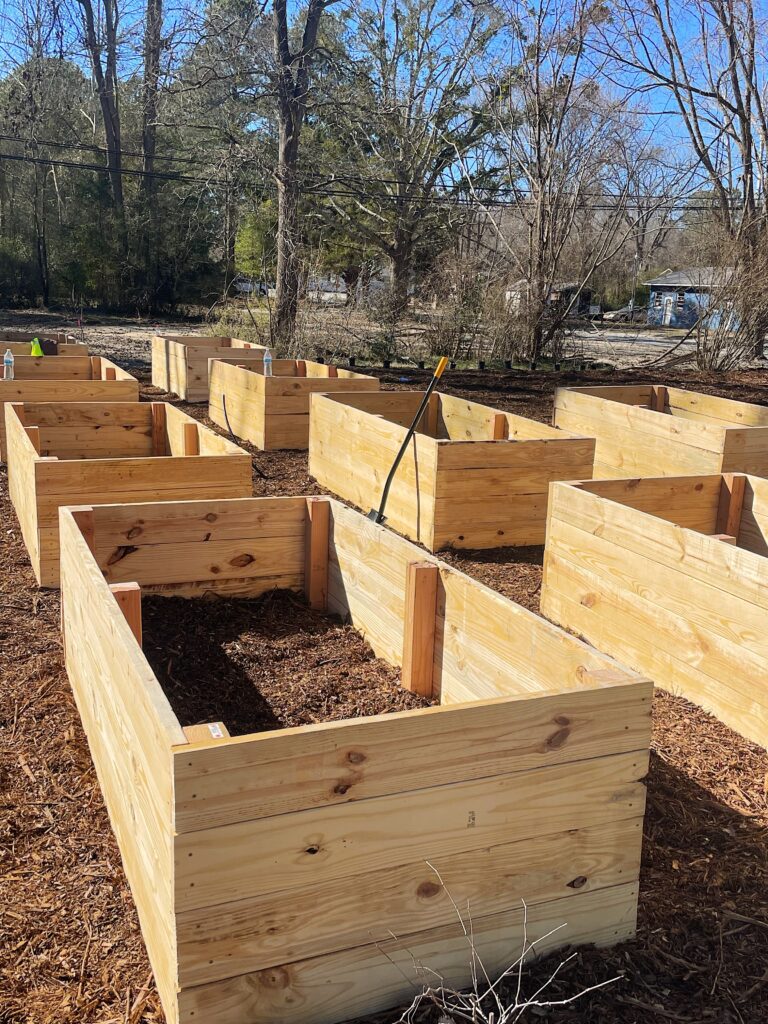
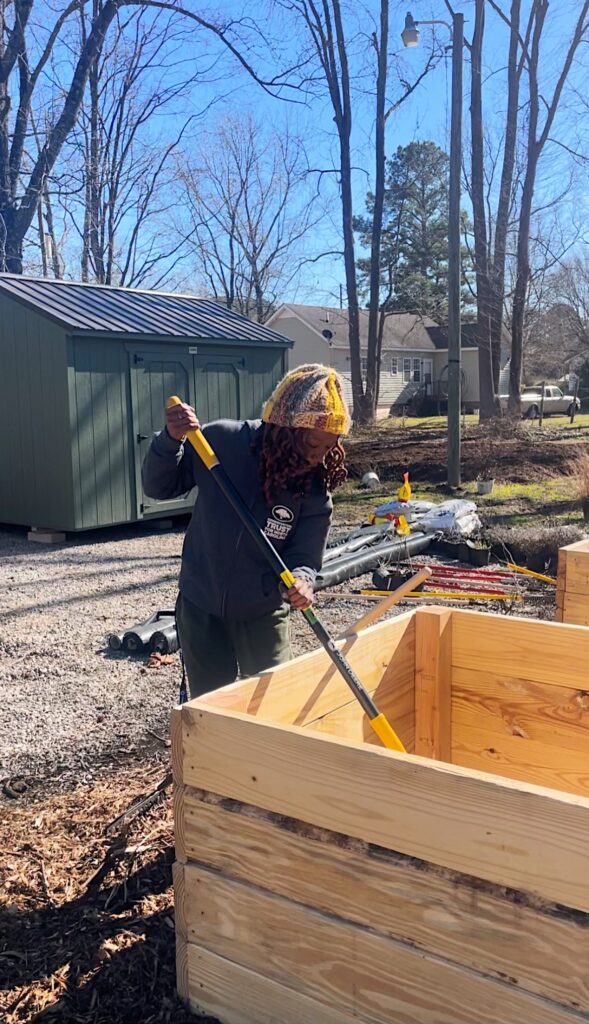
John Sugg: Upper Coastal Plain Council of Governments
John Sugg is currently serving five counties served by the Upper Coastal Plain Council of Government (COG)—Edgecombe, Halifax, Nash, Northampton, and Wilson. Each of these counties faces various challenges from chronic flooding and stormwater issues. As part of John’s AmeriCorps service, he will assist the COG with completing flood solutions assessments of nine communities, so they’re better equipped to pursue mitigation and build resilience for possible future flooding events.
The Golden Leaf Flood Mitigation Grant presents opportunities for communities to address flood-related issues. John has already assisted two communities pursuing a Golden Leaf Flood Mitigation Grant, acknowledging the cumbersome documentation process for rural towns with limited resources and staff capacity.
Currently, John is working with the community of Gaston to collect photos and data illustrating the impact of rainfall events in the area. Despite receiving only 1-2″ of rain, the area experiences prolonged water accumulation, rendering yards unusable and hazardous areas for days after the rain subsides. This persistent issue, not attributable to hurricanes or other extraordinary events, displays the urgent need for creating interventions to mitigate flooding risks and prevent further damage to communities.
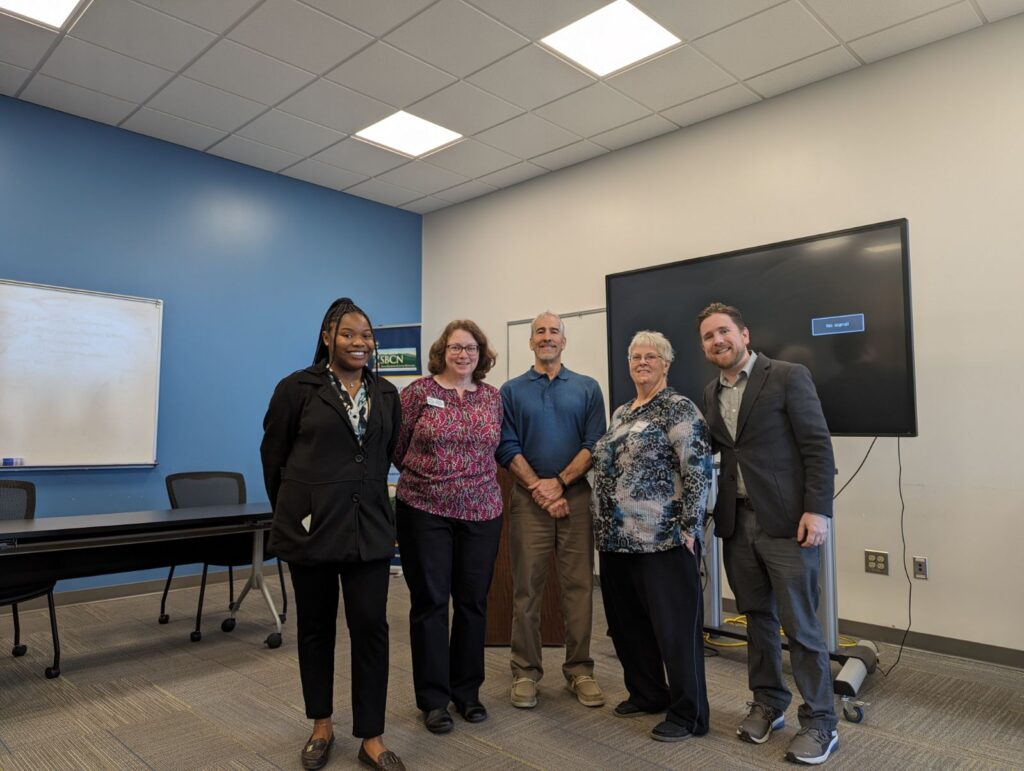
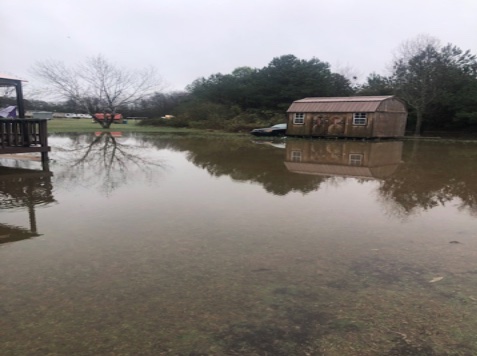
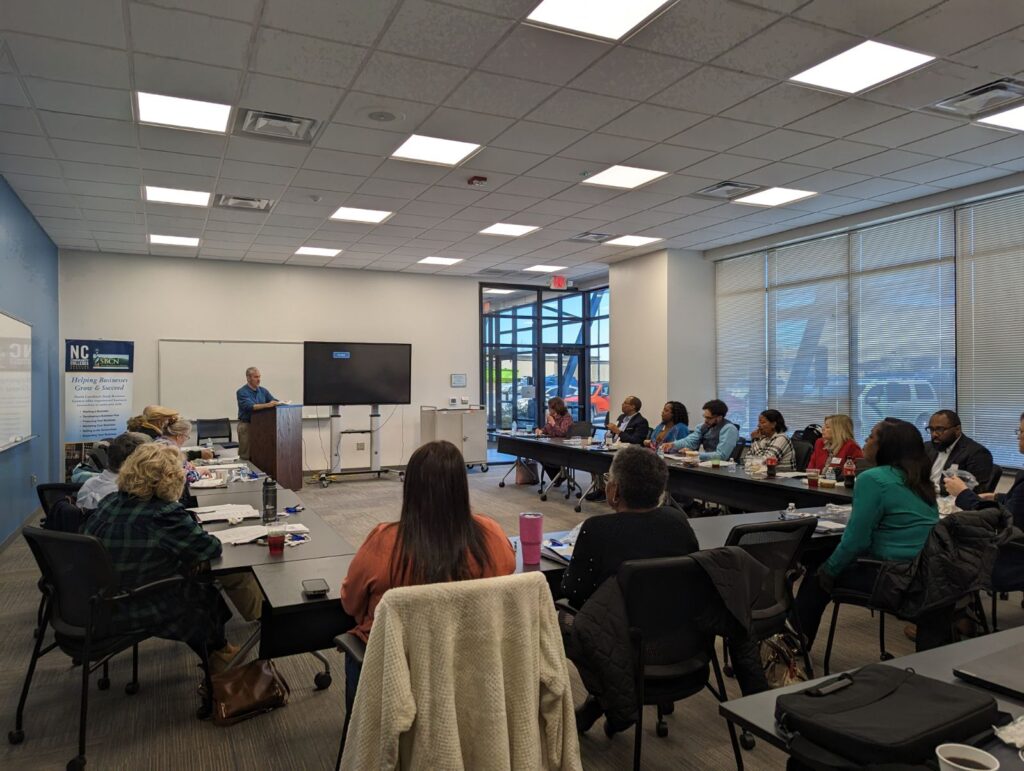
Hannah Nystrom: Cape Fear River Watch
Hannah Nystrom, stationed at Cape Fear River Watch (CFRW), directs her efforts towards the Burnt Mill Creek watershed in Wilmington, a socially vulnerable and highly recreated area. Spanning approximately seven square miles in downtown Wilmington, the watershed deals with numerous water quality issues such as fecal bacteria contamination, invasive aquatic species, and low dissolved oxygen levels, leading to its inclusion in North Carolina’s 303(d) list for impaired waterbodies. With a population of vulnerable residents in this community, the protection of this watershed is crucial to their wellbeing and the resilience of Wilmington
The state attorney general’s office awarded CFRW a three-year Environmental Enhancement Grant (EEG) to fund a restoration project aimed at addressing these challenges. Hannah actively engages in the project to ensure project deliverables are completed. She coordinates tree plantings, installs litter mitigation devices in stormwater drains and creeks, and organizes ecotours within the Burnt Mill Creek watershed. One of her most rewarding experiences involves watering native trees planted by over 75 volunteers, an activity she conducts weekly with fellow volunteers, fostering a deep connection with the area she serves.
Protecting the Burnt Mill Creek Watershed and the surrounding areas allows for members of the community to have easily accessible and beautiful nature areas to fish, explore and recreate in. Preserving areas that foster wildlife and allow for the ecological factors of coastal NC to thrive allows for greater climate resilience.
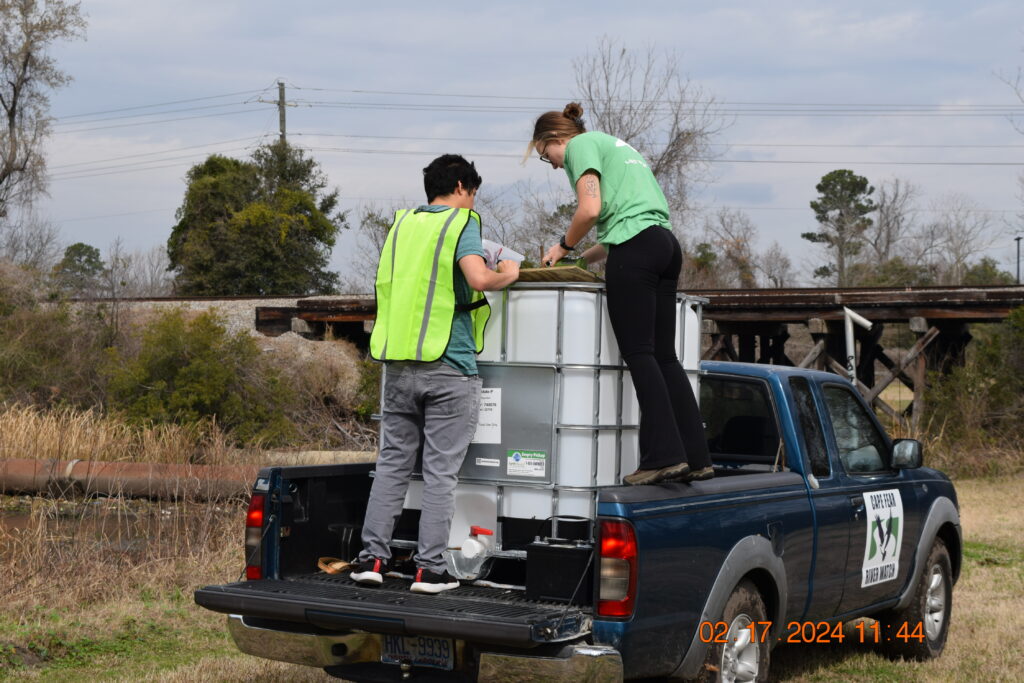
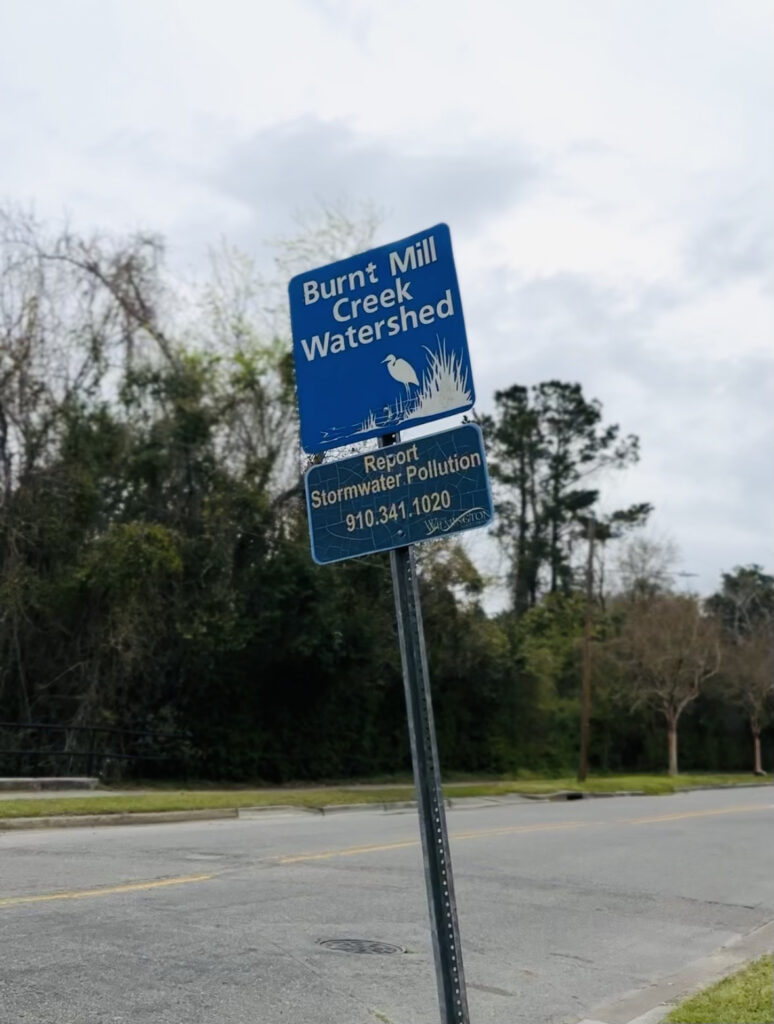
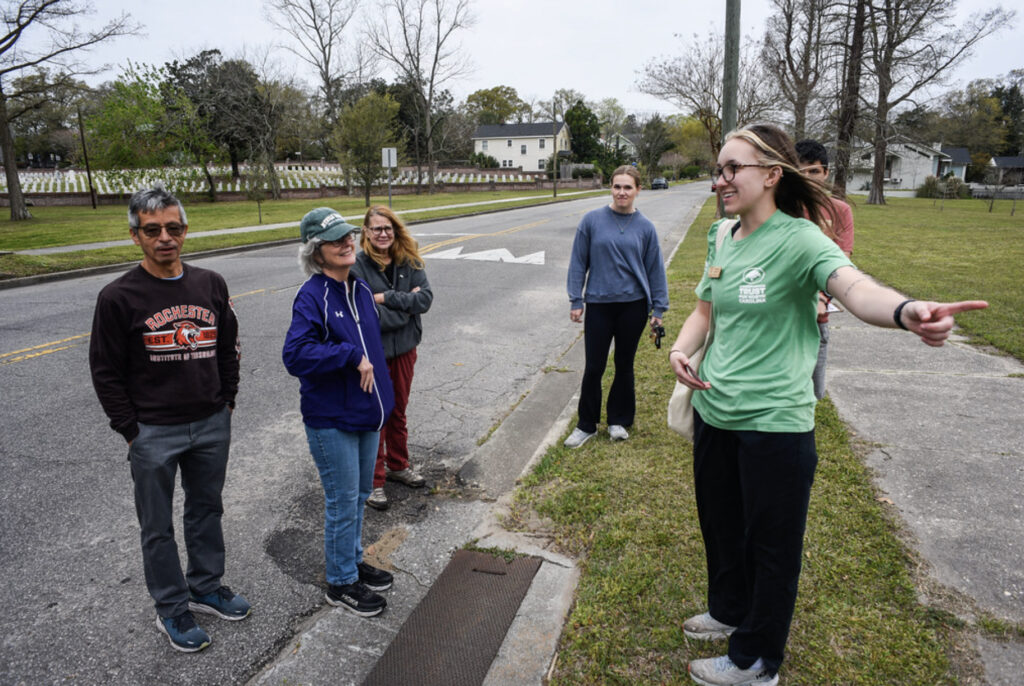
Lauren Waibel: North Carolina Coastal Land Trust
In her position at the Coastal Land Trust, Lauren Waibel assumes responsibility for general stewardship, community conservation projects, and overseeing the volunteer program. Recent months have been marked by intensive monitoring of preserves and properties, providing opportunities to observe diverse flora and fauna and leading trail maintenance activities across preserves.
One particularly significant project involves the restoration of Reaves Chapel A.M.E. Church, a historic landmark with deep cultural and historical roots in southeastern North Carolina’s African American community. Engaging with various organizations and individuals connected to the chapel has been inspiring for Lauren. She recently led a highly successful volunteer day, which saw significant participation, aimed at cleaning up the Reaves Chapel cemetery.
Lauren’s role has afforded her invaluable insights into the ecosystems, history, and community dynamics of Coastal North Carolina.
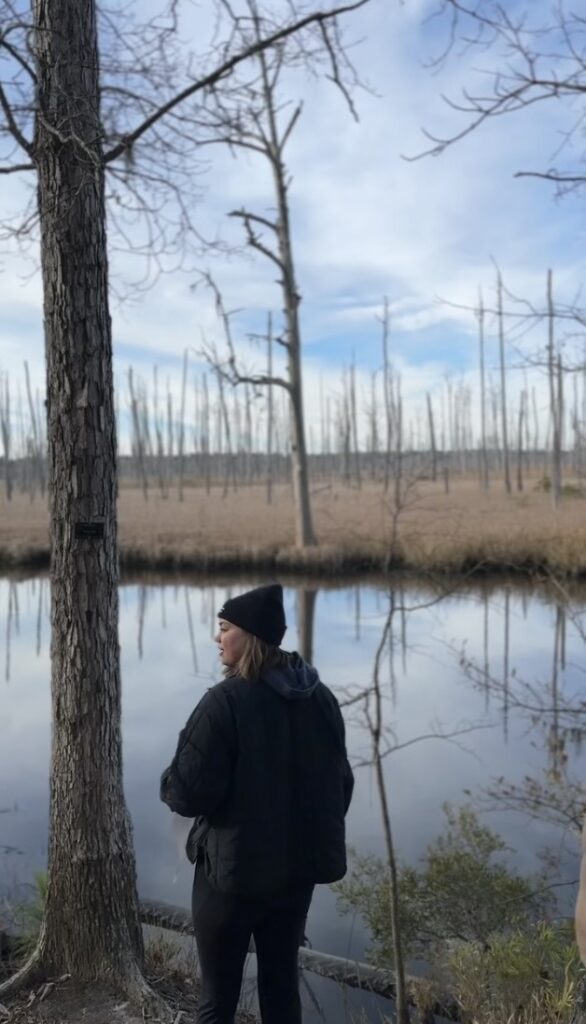
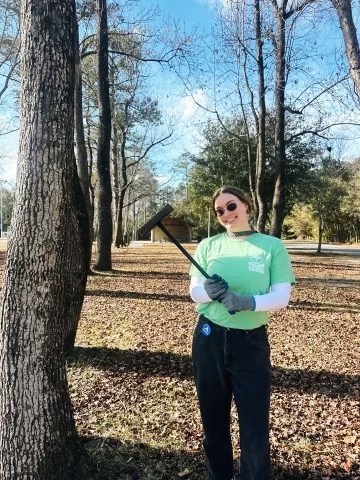
Jordan Pilcher: North Carolina Coastal Land Trust
In Jordan Pilcher’s role as the Environmental Education and Volunteer Coordinator at NC Coastal Land Trust (NCCLT), she has had the opportunity to lead and continue several projects, many of which were established and set into motion by the previous AmeriCorps member, and now full-time staff member, Bryce Tholen.
The environmental education program at NCCLT has grown tremendously and Jordan dove into teaching environmental programs across coastal North Carolina. She has been teaching the elementary students along the coast of NC using the curriculum on pollination and pollinators for 3rd graders, carnivorous plants for 4th graders, and longleaf pine ecosystems for 5th graders.
During the beginning of her term, she spent time editing and updating the curriculum and materials to ensure lessons are interesting and engaging. Jordan has also tabled at several environmental education and community outreach events, growing the Coastal Land Trust’s presence in the Wilmington community and connecting kids with the ecosystems surrounding them. Conducting outreach to the community and their youth is crucial to building long-term conservation stewards who will carry the responsibility of building Wilmington’s resilience for future generations.
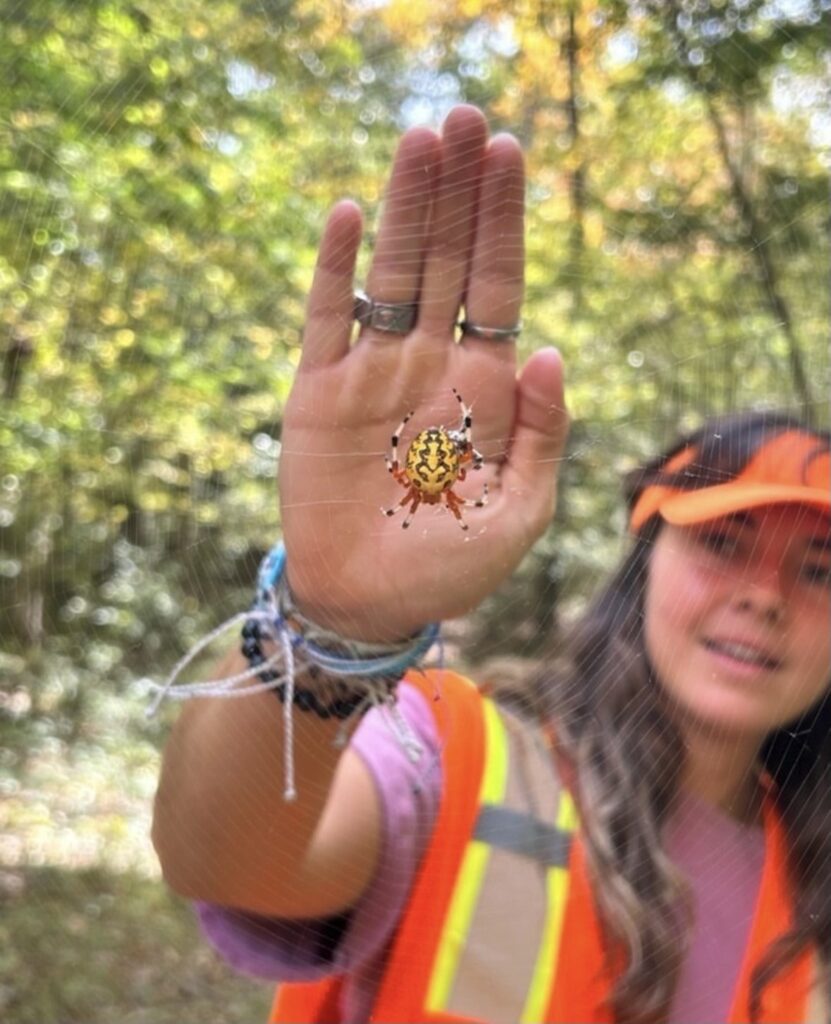
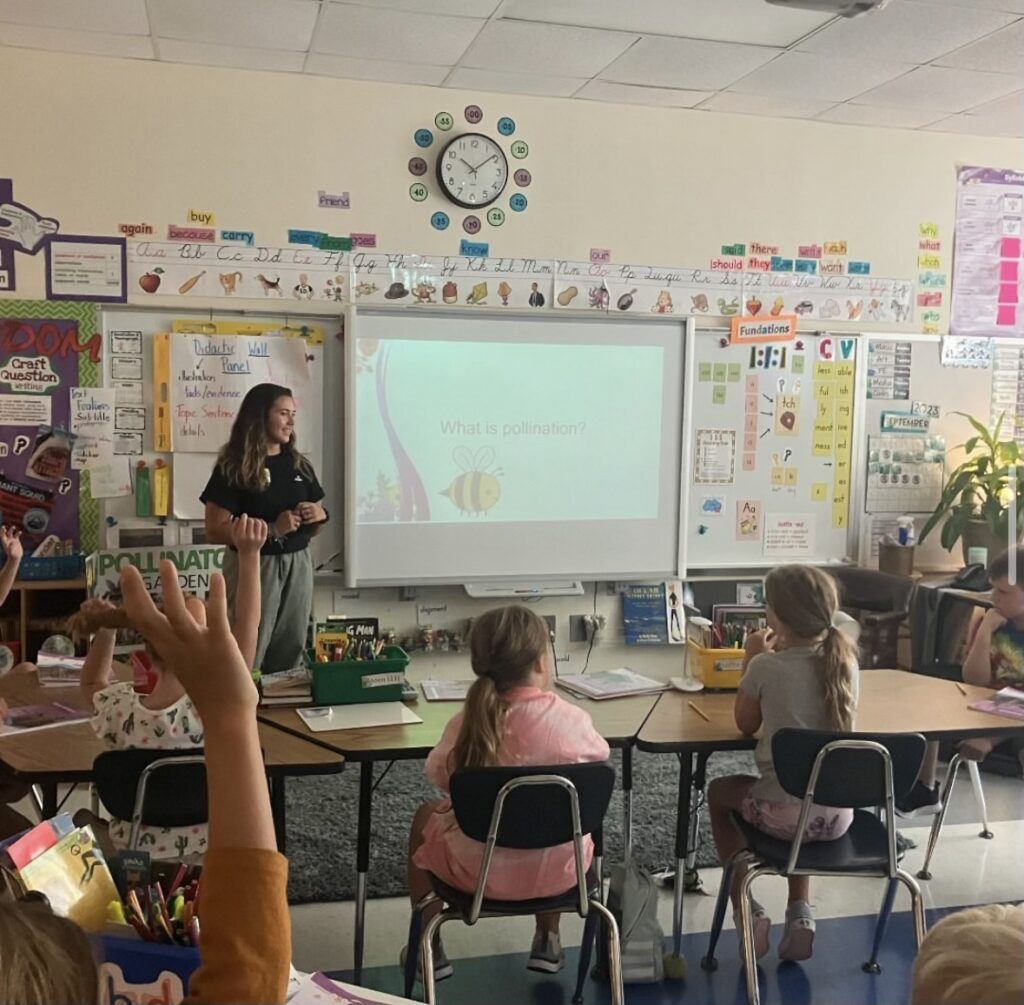
Charlie Robinette: Kerr-Tar Regional Council of Governments
Charlie Robinette serves with the Kerr-Tar Regional Council of Governments (KTCOG) where he is dedicated to building connections across the five counties served by the organization. Engaging with various stakeholders in the food sector, ranging from Cooperative Extension and Economic Development to local pantries and non-profits, Charlie aims to understand the region’s dynamics firsthand. He gradually became involved in ongoing projects, such as the Eva Clayton Rural Food Institute’s Advisory Board and Tri-COG FEEDS, a collaborative effort spanning multiple counties and councils.
In 2020, KTCOG adopted a Regional Food Policy, laying the groundwork for establishing a Regional Food Council. With Charlie’s enhanced capacity, progress towards this goal has accelerated, with plans for the council’s inaugural meeting scheduled for May. Through “Framing Our Food System” conversations across the five counties, Charlie seeks to gather valuable perspectives informing the council’s work and future COG policies and programs. The enthusiasm expressed by community members for his initiatives pushes the potential for lasting impact beyond his tenure with AmeriCorps.
Charlie finds great satisfaction in food systems work, particularly in the communal aspect where every gathering ensures participants are well-fed, symbolizing the importance of inclusivity and collaboration in building a sustainable future.
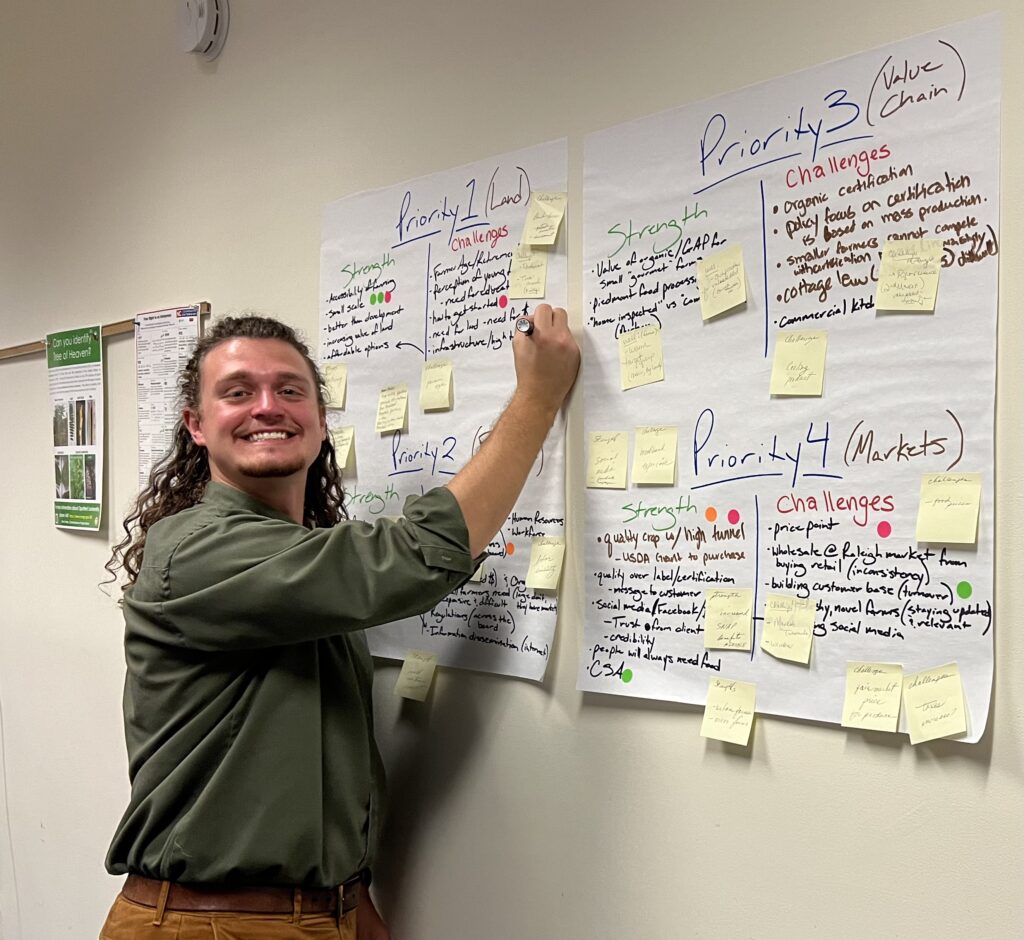

The Future of Resilience in Eastern North Carolina
Eastern North Carolina is an ecologically diverse region of the state that requires an investment in capacity to combat food insecurity, explore and implement flood mitigation strategies, and continue to preserve coastal land for future generations to enjoy. Between CTNC and our community partners, AmeriCorps members can achieve tangible progress toward achieving goals that build resilience for North Carolina.
Checking in with Our Resilience Corps NC Partners
As AmeriCorps members are halfway through their service term, tangible evidence of community resilience emerge
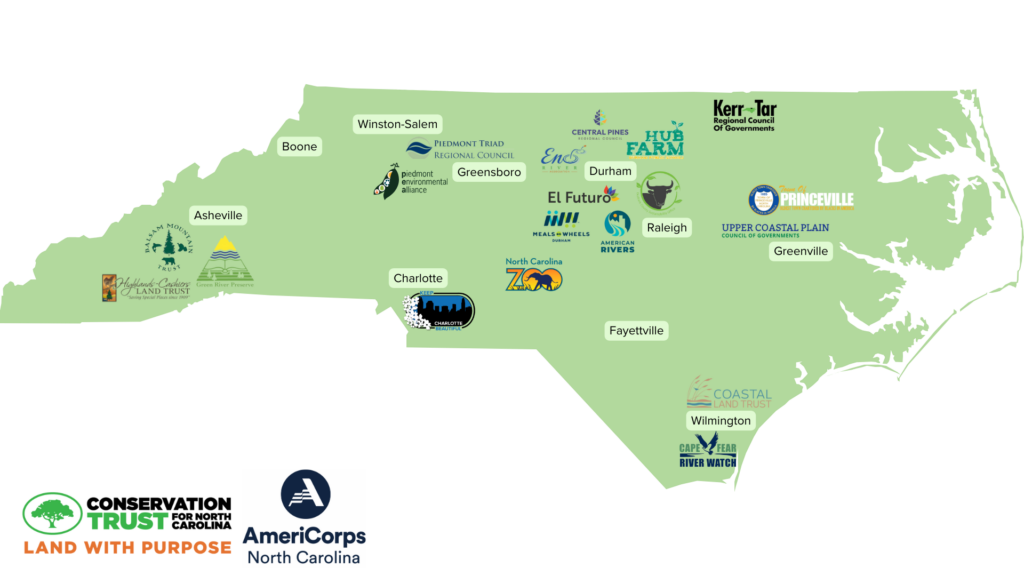
CTNC is working alongside our partners to build a network of service throughout North Carolina. The Resilience Service Network brings together the expertise of CTNC, Conserving Carolina, and Conservation Corps NC to leverage the investments of AmeriCorps to build capacity of nonprofits, local governments, and agency partners to achieve resilience.
CTNC’s AmeriCorps program, Resilience Corps NC, has partnered with 20 host site partners to deploy 23 members in service to communities with climate risk and capacity needs. These members are now halfway through their service term, which began in September of last year. With members serving in over forty communities across the state, tangible evidence of community resilience is present.

How do we select these community partners? CTNC seeks to prioritize community partnerships where a high climate-risk to flood, fire, food insecurity, or urban heat effects is affecting socially vulnerable communities and people throughout North Carolina. Using data assessments found in our Community Resilience Model, a GIS map that pinpoints the communities of NC that could benefit the most from climate change resilience work, we can ensure our AmeriCorps partnerships are delivering on CTNC’s goals to build resilience throughout the state.
See where our partnerships are growing resilience:
| Anna Behnke Conservation Trust for North Carolina Communications & Outreach Associate | Austin Duncan Central Pines Regional Council Stormwater Education Coordinator | Charlie Robinette Kerr-Tar Council of Governments Resilience Project Coordinator | Christopher Perdomo Piedmont Environmental Alliance Environmental Educator |
| Cindy Rassi El Futuro Community Engagement & Therapeutic Green Space Coordinator | Crystal Nowell Durham County Sustainability Office Community Stewardship Coordinator | Eli Haines-Eitzen Eno River Association Education Program Coordinator | Ellen Davis Central Pines Regional Council Community Development |
| Gina Patton Balsam Mountain Trust Education Outreach | Grace Sigmon North Carolina Zoo Natural Areas Conservation Educator | Haley Bock Piedmont Triad Regional Council Environmental Programs | Hannah Nystrom Cape Fear River Watch Resilience Project Coordinator |
| Hannah Rhodes American Rivers Resilience Project Coordinator | Jessica Blackburn Highland-Cashier Land Trust Environmental Education | John Sugg Upper Coastal Plain Council of Governments Resilience Project Coordinator | Jordan Pilcher North Carolina Coastal Land Trust Education & Volunteer Coordinator |
| Lauren Howard Green River Preserve Education Member | Lauren Waibel North Carolina Coastal Land Trust Stewardship & Community Conservation Coordinator | Lula Zeray Meals on Wheels Durham Volunteer Services Associate | Rae Cohn The Hub Farm Educator & Farm Member |
| Sabrinah Hartsell North Carolina Zoo Nature Rock’s & Virtual Programming Assistant | Tanya Balaji Keep Charlotte Beautiful Engagement & Education Specialist | Tykia Lewis Town of Princeville Outreach Coordinator |
The Resilience Service Network Case for Support demonstrates the need for additional capacity in vulnerable communities across the state. By building capacity in partnership with local leaders, the work being accomplished by these members will successfully increase the capacity of what each organization can accomplish.
Resilience Corps NC members have built capacity at each of their host sites, whether it be tree planting, organizing volunteer events, community outreach and engagement, land monitoring, environmental education, climate change education, and many other projects designed to seed future resilience.
CTNC is proud to champion the movements completed by the Resilience Service Network. Advancing community resilience through building relationships and partnerships is a critical component of all conservation efforts. Having members placed in all regions of the state, Western, Piedmont, Central, Eastern and the Coast, ensures that vulnerable communities are both represented and included in statewide conservation initiatives.
AmeriCorps Spotlight: Emily Taylor
Emily Taylor teaches future generations about Western NC species and how to protect them.
A graduate of Iowa State University, Emily applies her studies in Biology and Environmental Science to teach students about nature conservation. She serves as Education Outreach Coordinator for Balsam Mountain Trust in Sylva with Resilience Corps NC. Her main focus: collaborating with different local communities and nature-based organizations to provide accessible, quality conservation education.
Emily creates, improves, and teaches environmental science programs to Title I schools, public libraries and other community groups with help from live animal ambassadors. She showcases incredible species of the Southern Blue Ridge Mountains like hawks, snakes, turtles and more! Her favorite part about the job is working with the animals and showing them to elementary school students.
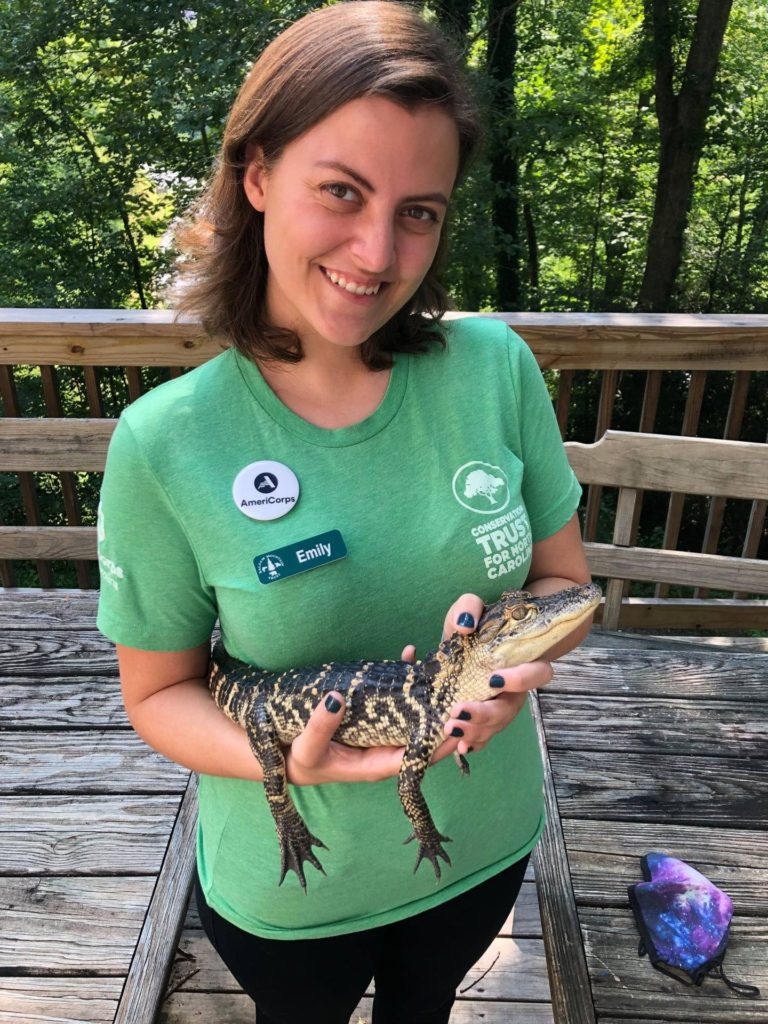
Thanks to her time at the Trust, she’s learning to have patience in others and believe in her decision-making skills. From Executive Director to Laundry Volunteer, Emily gained an appreciation for the way everyone pitches in to work toward Balsam Mountain Trust’s mission. “You wear many hats,” says Emily.
Expanding conservation in communities isn’t one-size fits all. By paying attention to how people communicate, she customizes how she shares lessons for all students. “You meet a lot of different kinds of folks, and we have to come up with several ways to disperse the same information. It requires a lot of thought and body language reading,” says Emily.
Beyond AmeriCorps, Emily hopes to continue work in Haywood County at zoo facilities like the Western North Carolina Nature Center. We’re looking forward to seeing what the future has in store for her!
AmeriCorps Spotlight: Lance Nathaniel
Discovering crossroads between intersectionality and environmentalism with AmeriCorps.
Lance Nathaniel promotes intersectionality and community engagement with Resilience Corps NC at Keep Charlotte Beautiful. He is a graduate of Western Carolina University where he studied anthropology, emergency disaster management and leadership.
As an AmeriCorps member, Lance helps to conduct effective volunteer outreach throughout Charlotte’s non-traditional communities. He’s not only learned about how to teach others about sustainability and uplift communities, but also discovered how manmade resources have an impact on our bodies and environment.
Lance speaks on how conservation and environmentalism needs to be supported on a systemic level. “There is much more to helping our planet than replanting trees and recycling. More funding needs to go to compost and ending petroleum-based items like plastics.”
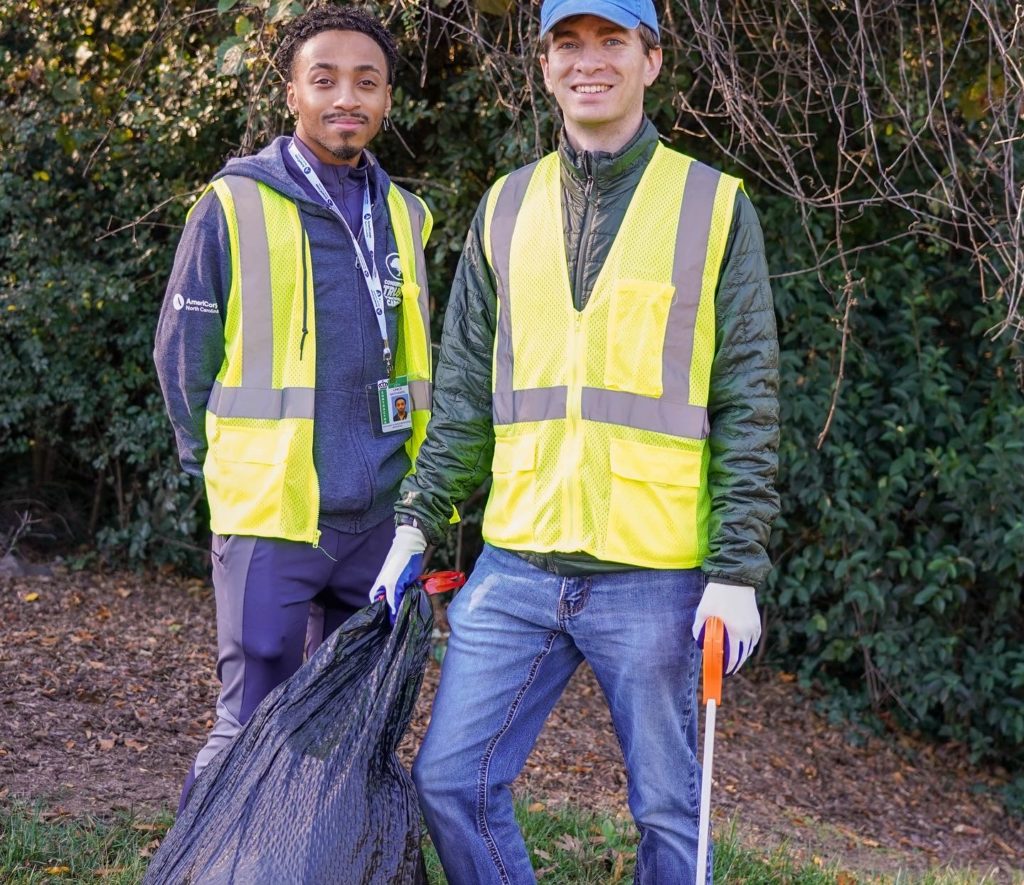
What do you do?
As the AmeriCorps service member for Keep Charlotte Beautiful, my role is to develop and promote outreach for the city’s Adopt-a-City Street program, litter pick-ups, environmental education for K-5 students, and engaging with communities at a grassroots level to promote healthy ways to keep Charlotte beautiful and healthy.
What do you love about your current role?
I love learning about the history of Charlotte; there is so much Black history often left in the shadows. So many heroes from the Civil Rights Movement and their descendants reside in the city, still fighting for their rights. Most importantly, seeing how environmentalism plays a role in this intersectionality, I love how the resources I share with various communities can help with those efforts in creating a more equitable society.
What do you wish people knew about working in conservation?
I wish people knew how intersectional conservation is. The environment and the items we use have a direct impact on our health and it requires EVERYONE to take care of it. Not just government or city officials, we truly have to incorporate nature into our lives that is not independent of us but is a part of us.
After AmeriCorps, Lance plans on offering his experience toward decolonization efforts and promoting cultural and environmental sustainability for many Black and brown communities that are being pushed out by corporations. We look forward to seeing him make strides in his work for his community!
CTNC’s service programs allow us to provide capacity and support to resilient community partners throughout the state. To learn more about CTNC’s AmeriCorps service program or apply for an open position, click here.
AmeriCorps Spotlight: Grace Sigmon
Uplifting communities through conservation education and recreation with Resilience Corps NC
As the AmeriCorps Natural Areas Conservation Educator Grace Sigmon helps to expand the North Carolina Zoo’s education, recreation, and conservation programs in Asheboro.
Each day has something different in store at the Zoo! Grace’s favorite part about her job: connecting with nature most of the day instead of sitting at a desk. She primarily helps the Zoo’s Trail Team and collaborates with volunteers and her community to advocate for public trails and conservation.
Most of Grace’s time consists of survey projects on animals like salamanders, turtles and nesting birds. She serves her community by combining environmental education, land maintenance, and wildlife observations by:
- Planning and hosting guided hikes on Zoo trails and nature preserves
- Aiding in routine trail maintenance and building new trails
- Creating children’s programs about conservation in person and online
She wants people to know conservation isn’t a lonely job. In fact, communication is one of the most valuable skills to have. “Conservation careers require team effort in order to achieve goals. It takes both people within and outside of this field to make a positive impact for the sake of wildlife, the environment, and humanity,” says Grace.
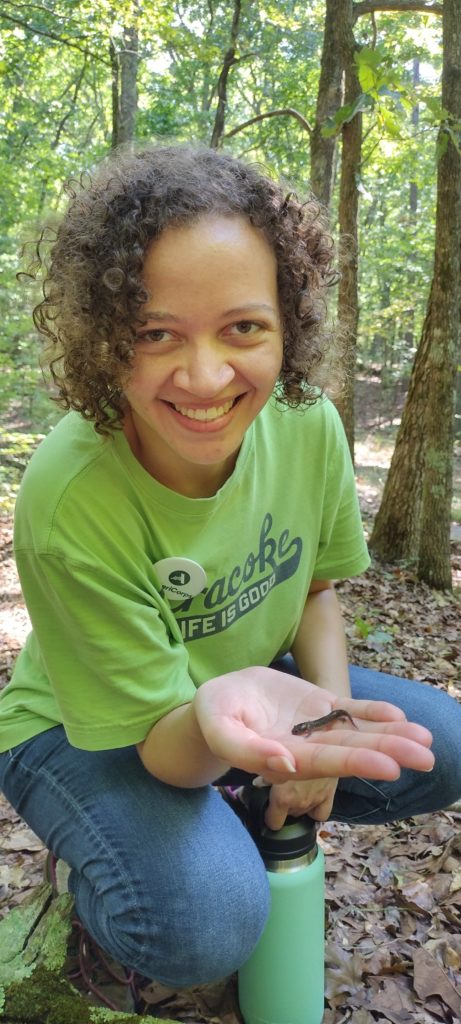
A lot of Grace’s work with AmeriCorps has taught her the value of quality over quantity by finding a balance between downtime and work. She says it’s easy to accept too many tasks, but when she takes on fewer jobs in a day, her projects and wellbeing flourish.
The benefits of conservation have its roots in equity according to Grace. Expanding conservation means providing people with necessities so we can all fully engage in helping our environment.
“Conservation only works if everyone participates and benefits from it. Communities must be lifted up and receive the common needs that everyone requires so conservation efforts and opportunities can be established.”
Thanks to her experience with the Zoo and AmeriCorps, Grace has many options for her next steps working in nature. She’s confident she wants to stay in the conservation field. We can’t wait to see what’s to come for Grace!
CTNC’s service programs allow us to provide capacity and support to resilient community partners throughout the state. To learn more about CTNC’s AmeriCorps service program or apply for an open position, click here.
Invest in Conservation for North Carolina’s Future
Our state’s conservation needs are not one-and-done. CTNC and our fellow members of the Land for Tomorrow coalition are working with state leaders to build on the foundation of conservation funding. Every generation deserves to have healthy functioning land and water that are not only beautiful but also provide clean air and water.
We commend our governor and legislators for passing a budget in 2021 that prioritized land and water conservation. Our state leaders put our parks, game lands, forests, trails, and farms at the top of the priority list and we are thankful for that. This historic spending allocation was the highest since the 2008 recession and will benefit people and nature for generations to come.
Land and water are North Carolina’s most important economic assets. The four engines of North Carolina’s economy – agriculture, tourism, forestry, and the military – depend on natural and working lands and clean water. Protecting these vital natural resources is essential to ensure these economic drivers will continue to flourish and provide jobs for North Carolinians.
Our state’s conservation trust funds ensure that the North Carolina Land and Water Trust Fund (NCLWF), Parks and Recreation Trust Fund (PARTF), and the Agricultural Development and Farmland Preservation Trust Fund (ADFPTF) are fully funded to be the safeguards for our state. These funds enable conservation groups to continue working with state agencies to protect North Carolina’s valuable natural resources, ensuring that both current and future generations will continue to benefit from all our land has to offer.
In 2022, we are asking for our legislators to invest in our state’s future. With necessary increases in funding to the conservation trust funds, we will all be able to protect our state’s clean water, parks and recreation land, and farmland. Our state legislators alone determine the fate of the conservation trust funds and important legislation that helps our state thrive. Forward planning is what we’re asking for today.
Land and Water Fund
Increase recurring funds to:
- $25 million recurring in FY22-23
- $35 million recurring in FY23-24
- $45 million recurring in FY24-25
Parks and Recreation Trust Fund
Increase recurring funds to:
- $25 million recurring in FY22-23
- $35 million recurring in FY23-24
- $45 million recurring in FY24-25
Additional Funding for Conservation Projects
Non-recurring funds to LWF for military projects and to help match the FY 2023 ENC Sentinel Landscape REPI Challenge proposal to the US Dept of Defense
Heirs Property
The Land for Tomorrow Coalition supports HB 367/S363, Uniform Partition of Heirs Property
Conservation Tax Credit
The Land for Tomorrow Coalition supports H323, Military Readiness and Rural Resilience Act
Restore Dedicated Conservation Funding
Adopt House Bill 372/Senate Bill 354 “Restore Funding/State Conservation Purposes”
Trails Funding
Land for Tomorrow support recommendations from the Great Trails State Coalition
State Parks
The Land for Tomorrow Coalition supports recurring funds to NC State Parks to open & operate new facilities and land funded by the Connect NC Bond, PARTF stateside LWCF and other sources as recommended by the Department of Natural & Cultural Resources
Game Lands
The Land for Tomorrow Coalition supports recurring funds to NC Wildlife Resources Commission to manage new and expanded game lands as recommended by the WRC
Forests
The Land for Tomorrow Coalition supports recurring funds for NC Forest Service to manage state forests as recommended by the Commissioner of Agriculture
Help us make sure that our land and water is protected for everyone.
Invest in Conservation for North Carolina’s Future
- Share on social media – Share a photo or video about the land you’ve enjoyed and want to protect using #land4tomorrow on Twitter or Instagram.
- Ask your friends to join – Encourage your friends to make a video.
- Thank your legislators – Let them know we appreciate their support of NC land and water
AmeriCorps Spotlight: Haley Bock
Educating future generations to protect our planet
Haley Bock connects with her community through teaching conservation
After earning her Bachelor of Science in Public Health, Haley Bock is serving her community working with Resilience Corps 2023. Haley serves as the Environmental Programs AmeriCorps Assistant in the Stormwater SMART Department with the Piedmont Triad Regional Council in Kernersville.
She’s been loving the connections she makes working in schools and conferences throughout the Triad. Haley says working in conservation is important because it teaches future generations how to help protect our planet.
In your own words, what do you do in your current service role?
Currently, I am working on the nature notebooks, which we plan on printing 20,000 of. They are a magazine-type material that will be given to schools and libraries within our municipal areas. I am also currently working on getting my Environmental Education Certificate because I would like to pursue this after my term.
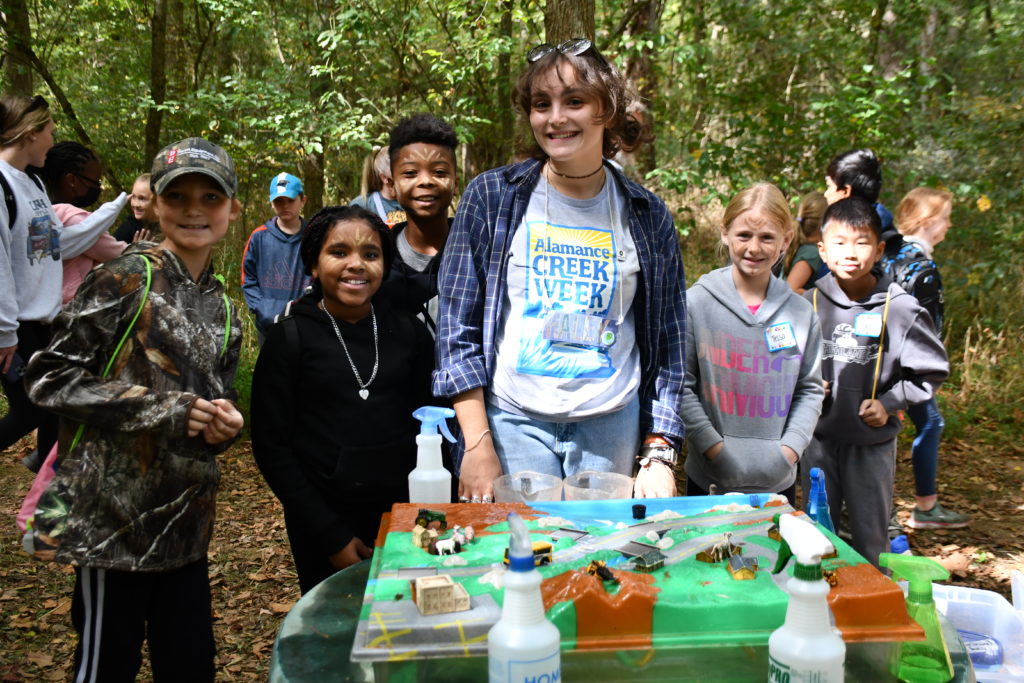
What lessons have you learned since joining the program?
I’ve learned that when working with kids I have had to adjust the language I use in each classroom. Working with 3rd graded is very different than working with an 8th-grade class. I’m expanding my knowledge of working with all different ages.
What do you wish people knew about working with communities to expand conservation?
Environmental education is the most important thing when it comes to conservation. If one doesn’t know exactly what [conservation] entails, then how can they start to help in their communities? Getting people involved in activities outdoors is so important because they might not have that opportunity in their homes, and they get to expose themselves to new and exciting environments.
Haley has options after her time with AmeriCorps, but she knows she wants to continue teaching in her community. Whether she stays in Winston-Salem or goes abroad with PeaceCorps, we can’t wait to see what her future holds!








